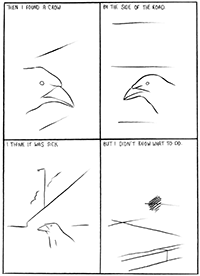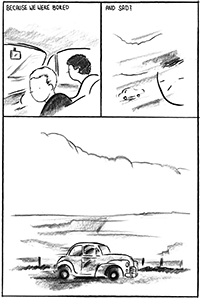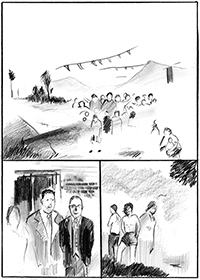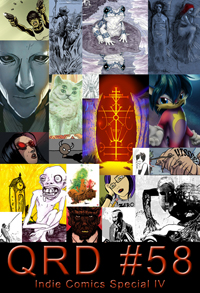
February 2013
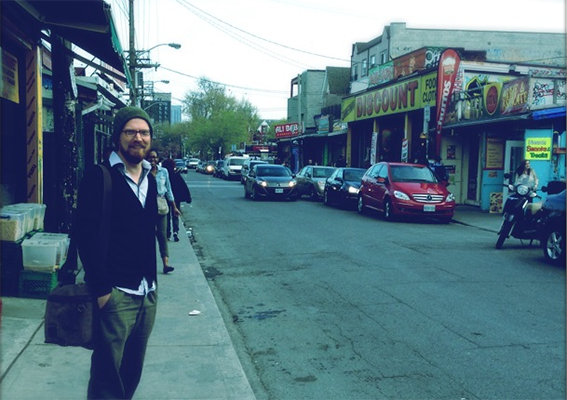
City: Bristol, UK
Comics: SMOO Comics, The Escapologist, Bear Pit Zine (co-editor)
Websites: smoo.tumblr.com, bearpitzines.tumblr.com, betterdrawn.com
QRD – How old were you when you first got into comics & did you always stick with them or did you come back to them?
Simon – Young! When I was little I used to read my parents’ collection of Peanuts paperbacks, the little Coronet editions. Later, I read Calvin & Hobbes & Raymond Briggs & then I went through the usual Marvel phase. Then I found Sandman & similar comics in my mid-teens. After that, I didn’t really read comics for a few years until I started making my own, when I discovered this world of self-publishing. What I loved about all those early comics (& I think what bought me back to the medium) was the juxtaposition of something subtly splendid happening in the ordinary lives of the protagonists, whether it’s Snoopy as pilot or Calvin & his daydreams. They were all internal things, things that made life exciting, but things that didn’t rely on “reality” to be ratified, just imagination. I like that. The power of looking at your life & then saying, “Hey, that bit of sky there? That’s pretty magical.”
QRD – How old were you when you put out your first comic?
Simon – I put out my first comic, SMOO #1 in May 2008 when I was just shy of 25. It had a print run of 20 & I just went around a convention handing them out & leaving them on tables. I had no idea what I was doing & didn’t put out another comic until 2010. I’m now up to SMOO #6, nearly 30, &, arguably, I still don’t have a clue what I’m doing.
QRD – Why comics instead of just writing or drawing?
Simon – I’ve always drawn & like many children I learned to draw & to narrate my own creations at the same time – “this is mum, this is us going into the car, that’s us going on holiday.” I think comics are a development of that. I like the idea that drawing tells stories, like cave paintings - I’d say maybe they’re comics. I’m really interested in the act of drawing in that sense. I feel that a lot of comics - both those that I enjoy & those that I don’t - operate to obscure the act of drawing from their art. This involves a sort of craft refinement to make something conventionally beautiful - brushstrokes in comely lines or colours & hues that belie any kind of evidence of application - say by brush or by digital direction. I definitely do a bit of that, of course, but hopefully not too much. I’m more interested in reminding the reader that something can exist both as a mark made by another person & as a story. I like the idea, for instance, that a smudged pencil line can represent to the reader both a telegraph pole & a smudged pencil line; all at once it’s a photocopy of a bit of graphite, a short-hand for every telegraph pole the reader has ever looked at, & a telegraph pole that plays a role in a story. Learning to use that visual shorthand well & to use it to make stories, is one of the beautiful challenges of making comics.
QRD – Do you see mini-comics & indie comics as paths to mainstream comics or as their own unique media?
Simon – I think that mini-comics can be anything you want them to be. I think if we take “mainstream” to mean “comics of any genre with a large circulation published by an established publisher” then I can see how self-publishing might let you hone your craft towards that aim. Equally, if by “mainstream”’ you mean publishers like DC or Marvel, I’m sure you could easily do a small-press superhero comic that gives you a path to the big publishers, too. But for me, I’m not sure I’m doing either. I don’t do this to get “picked up by a major label.” I just want to make something for myself & for other people that I hope is meaningful. I like making these things & sharing them & hopefully people don’t mind me making more stuff to clutter up their worlds. The relationship between me & the reader hopefully defines what my particular mini-comic is.
QRD – Ideally would you self-publish?
Simon – I always want to self publish in some way, shape, or form. This doesn’t mean that I wouldn’t like to have some things published by someone else - having the support & advice of a good publisher could enable you to do some really exciting things (plus they pay for the printing) - but I would never do it at the exclusion of publishing something myself. I started it this way because I believe in taking control of my own production, my own creative impulse, & my own voice. I hope that won’t ever change, no matter what happens.
QRD – How many books do you produce a year & how many would you like to?
Simon – I put out three mini comics this year - SMOO #4 (which I drew in 2011 & released in January) & SMOOs #5 & #6 (which I drew & published entirely in 2012). I also drew about 8 comics for anthologies in the UK, in Latvia, & in the US. I would think, though, that two mini comics a year is probably a more healthy & attainable goal. Actually, I’ve just started doing subscriptions for my comics, so that’ll help me stick to a schedule.
QRD – What do you do better with your comics now than when you first started?
Simon – Everything! Mind you, that’s not saying much.
QRD – What do you think of digital comics & webcomics?
Simon – There aren’t many good digital/webcomics I’ve seen, but that doesn’t meant there can’t be. It’s a bit of a truism to say we’re changing, as a culture, how we read, experience, & consume the world around us. At the moment, the digital comics we’re doing are mostly just facsimiles of the printed comic on the screen, a kind of skeuomorphic attempt to hide the difference between page & screen. Actually, what will happen is whole new ways of writing & story telling will emerge with the affordances of technology. So I think there’ll be new avenues aplenty for digital & webcomics.
That said, I don’t think we’ll ever be without the good ol’ printed word. For example, there’s plenty of talk about “the death of print” or the “death of music.” But honestly, can you kill stories? Can you kill music? We’ve been doing those things since human time began! Take the example of “song.” The idea of one, definitive version of a song that is around 4 minutes long is probably not even 100 years old. It was something that evolved out of recording & listening technologies & copyright law. Before that, songs grew & changed, were authored by all, sung by many, & evolved & regionalised. Then we built an economy around scarcity, the “the single” or “the definitive version of a song” & now we assume that’s what music, or song, is & has always been. But it’s new! Music can be anything! & now that we’re sort of shifting back to de-normalising that, taking the economic value of “the song” away, hopefully the act of making & sharing music might become important again.
I guess my point is that I don’t think ways of expressing ourselves are fixed. It just looks that way. I think we mistake the big systems - the economy, the record company, the publisher - for the thing we’d like to make - a story, something to share with a community. Just because I can’t win X-Factor, doesn’t mean I can’t make a nice song for someone & sing it to them. There are lots of ways to make something unique. Just don’t be fooled by the peril of the big systems. You can still do it.
So yes, I think those big systems are changing & that might change the context of the things we make & how we share them. But it isn’t the death of anything. It’s just another stage in evolution. Obviously, I don’t exactly know what this sort of argument means for print & books & comics per se, but I believe we won’t ever be without them. As long as we keep drawing, I think there will be printed materials, stories, comics, words & tales. Equally, perhaps the surfaces we draw on will change; perhaps who we draw for will change; perhaps how we share that drawing will change. But it’s up to us to explore that & make it our own.
QRD – What comic book person would you be most flattered to be compared to?
Simon – Someone nice.
QRD – What do your friends & family think of your comics?
Simon – They’re all very supportive, my partner especially. We both work full time in day jobs & sometimes it’s not easy or fun when I hide myself away in the evenings doing comics. I get away with a lot & she’s great. As for my friends, many of them would probably never read comics, but encourage me making them. Some really like them, some probably aren’t bothered.
QRD – What other medium would you like to see some of your comics made into (television, film, games, action figures, etc.)?
Simon – I’m not sure the world needs a fully articulated action figure of a sighing cartoonist who just wanders around stroking his chin & doesn’t contribute much to anything.
QRD – Anything else?
Simon – Get drawing.







